Kem Ley: A shooting that shook Cambodia
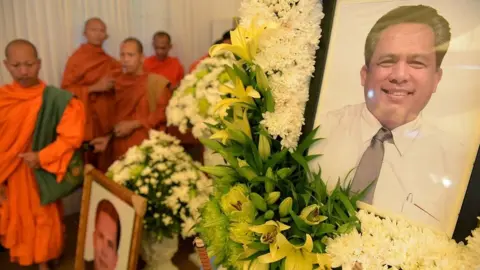 AFP/Getty Images
AFP/Getty ImagesOn 10 July 2016, Kem Ley, one of Cambodia's best known political commentators, was drinking his morning coffee at a petrol station cafe in the capital Phnom Penh when a man walked in and opened fire, killing him instantly.
The gunman - who gave his name as "Chuob Samlab" (Meet to Kill) - was arrested soon after when members of the public chased him down and beat him. Later identified as Oeuth Ang, he claimed that he had killed Kem Ley over an unpaid debt. Few believed him.
The murder sent shockwaves around the country, with many seeing Kem Ley's death as a return to the dark days of political assassinations in the Southeast Asian nation.
Cham Bunthet, who was a political analyst at the time, recalls a warning Kem Ley gave him just a week before his death, as Bunthet's young daughter slept on a table nearby.
"I remember he touched my shoulder and said: 'Brother, our lives are at stake here, it's risky. No matter what happens to us, make sure that our kids do not see our blood," Bunthet recalls. "Just a week later he was gone."
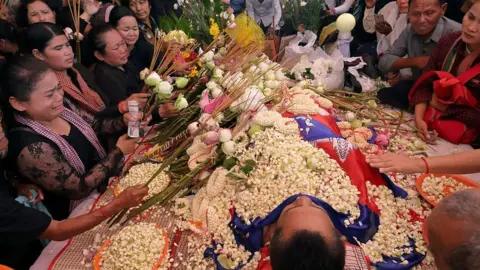 Getty Images
Getty ImagesUnlike many academics, Kem Ley was in his element when far from the comforts of the capital. Prior to his death, he had been working on what he called the 100 Nights Campaign, where he would stay in villages and listen to the deep-rooted problems the people there faced.
Kem Ley's voice could be heard in homes around the country on political radio talk shows. A fluent English speaker, he was often the first port of call for foreign journalists in Cambodia as they sought a balanced critique on the country's political landscape.
This even-handed criticism of both Prime Minister Hun Sen's government and the opposition was one of the reasons Ly Sreysrors, a 26-year-old researcher and one of Cambodia's few female political analysts, started attending Kem Ley's talks before his death.
"Dr Kem Ley was different from other speakers," she says. "His explanations were made in a simplistic manner with comparisons and examples that ordinary people could also understand, not only the experts."
But it was Kem Ley's criticism of Hun Sen, Cambodia's long ruling authoritarian leader, that many believe led to his downfall. Just days before he was killed, he had spoken publicly about a new report released by the NGO Global Witness, which detailed widespread corruption tied to Hun Sen and his family.
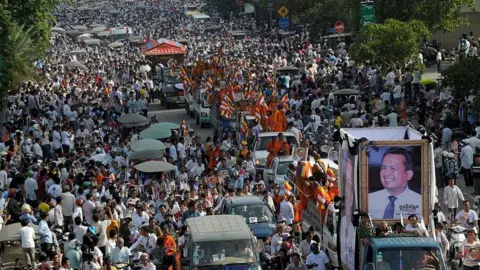 AFP/Getty Images
AFP/Getty ImagesKem Ley's killing led to an outpouring of grief around Cambodia. Thousands accompanied his body from the petrol station to a pagoda on the other side of the capital. Tens of thousands lined the funeral procession route from Phnom Penh to his home province of Takeo.
The murder served as a reminder of the risks in speaking out against the government. Many recalled the shooting of labour leader Chea Vichea in 2004 and environmentalist Chut Wutty in 2012.
Questions were asked about the killer's background when it emerged he was a former soldier who boasted of links to powerful members of police and military. He was sentenced to life in prison in 2017.
"Everybody felt threatened," says Bunthet, who initially continued to speak out before stepping back to focus on developing youth leadership programmes.
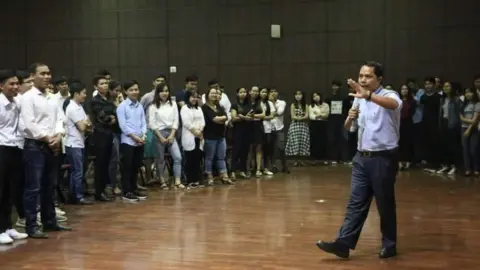 Cham Bunthet
Cham BunthetOu Virak, president of the Future Forum think tank and a media analyst, saw first-hand the chilling effect the murder of his friend had.
"It was so close to home and the message was so, so clear. It was definitely a devastating reminder of the risk involved and I think it is constantly playing in the heads of many of us," Virak says. "It also affects our family. I think for them the return of living with that uncertainty is a lot more difficult."
But Virak felt it was important to continue speaking out.
"I didn't want to be silenced, I didn't want other people to be completely silenced and I thought there was an obligation to try and keep the space [open] to send a message that we can't be easily silenced.
"I think maybe the message for young Cambodian people was that we've got to do more to speak out and shape the direction of the country."
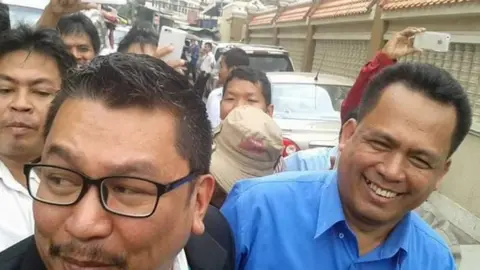 Ou Virak
Ou VirakLy Sreysrors was one of those young people.
She says the assassination led her to take her "first step" in her career by joining the Young Analyst Group, which Kem Ley had set up. She is now its president and can regularly be heard giving her opinions to what remains of the country's independent media.
"Here not many people dare to speak out about the weakness of the government because the result is obviously shown through the deaths and the imprisonments," she says.
"It was heart-breaking when he was gone, but I thought that besides crying I should do something. That's why I committed to continue his spirit, even though I face many challenges."
Those challenges and threats are real.
Sreysrors says she and other senior analysts have been followed by men taking photos. They have also received anonymous messages warning that another killing could take place.
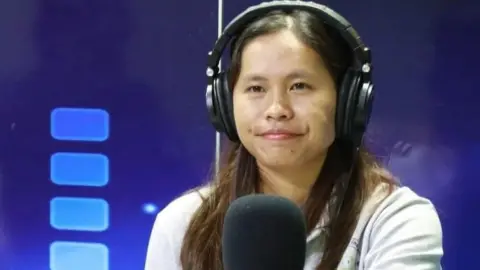 Facebook
FacebookKem Ley's death was a sign of dark times ahead for Cambodia.
In 2017, the government waged a crackdown on independent media and the only major opposition party, the CNRP, was dissolved. Cambodia is now effectively a one-party state. Activists and government critics are routinely targeted by the country's courts, which are widely accepted as just another arm of Hun Sen's ruling party.
"Kem Ley's killing, and the subsequent destruction of the grass-roots movement he represented, was the starting point for the rapid deterioration of the civil and political rights in Cambodia," says Phil Robertson, deputy Asia director at Human Rights Watch.
Robertson says there is no doubt that the government was behind Kem Ley's death.
"The brutal assassination of Kem Ley in broad daylight in downtown Phnom Penh shows how far impunity for political killings has gone in Cambodia," he says. "No-one doubts for a second that Kem Ley was killed at the behest of powerful people in the government."
The killer, Oeuth Ang, "was a crudely fashioned scapegoat quickly locked away by Cambodia's corrupt, politically controlled courts", he added.
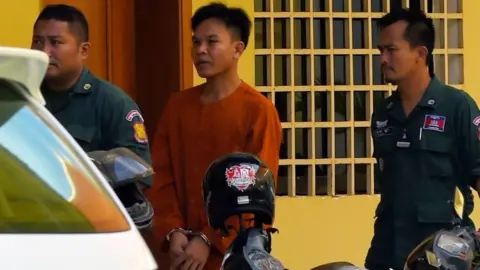 AFP via Getty Images
AFP via Getty ImagesPrevious vigils to mark the anniversary of Kem Ley's death have been broken up and resulted in arrests.
Government spokesman Phay Siphan says that people are free to honour the memory of Kem Ley in a pagoda or at home, but that the purpose of previous public vigils have been to "accuse the government" of involvement in the shooting.
"If someone has concrete proof, please come and show the government as well as the prosecutor. We can take care of that, the case is still open," he says. "We don't want to hear those accusations, they accuse Hun Sen of doing it. I say please, come on, let's find proof."
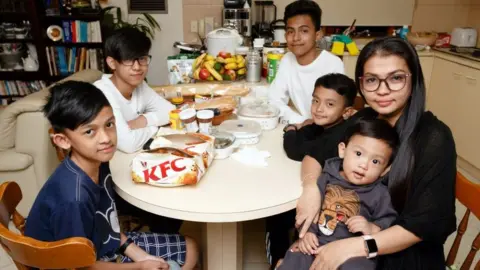 AFP/Getty Images
AFP/Getty ImagesKem Ley's wife, Bou Rachana, and four sons fled Cambodia soon after his death. He did not live to meet his fifth son, who was born months later in Thailand. The family have since been granted asylum in Australia.
On 10 July, Cambodians will be remembering Kem Ley both in private and public, despite the threat of arrest.
Half a decade on from his murder, the political commentator is still inspiring others to speak out against injustices in the country.
